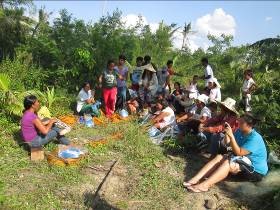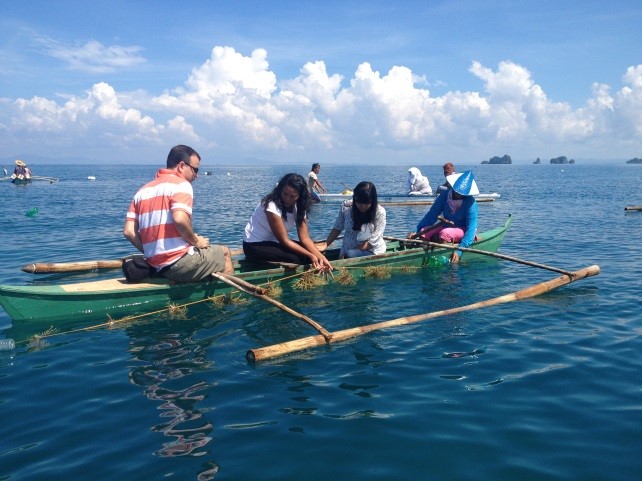Daily Archives: May 7, 2015
PRODUCTS AND SERVICES share
Project Management and Development
PDAP adopts a two-pronged approach in the promotion and delivery of its services: (a) focusing on donors as a target market; and (b) focusing on stable/sustainable collective enterprises as another target market. In the first approach, PDAP packages a proposal that addresses the preferences and priorities of development investors in terms of geographic areas, subsectors and target populations. In the second approach, PDAP directly identifies clienteles (i.e. stable/sustainable collective enterprises) and designs services that will help and strengthen the enterprises themselves as well as the members of the enterprises.
Value Chain Financing
Value Chain Financing for Collective Rural Social Enterprises (CRSEs) is a financing window for micro, small and medium social enterprises that are into sustainable agriculture and/or agribusinesses preferably in Organic Rice, Muscovado Sugar, Seaweeds, Coffee or Coco-sugar.
Collective Rural Social Enterprises (CRSEs) are organizations:
- owned or controlled by the marginalized sectors (i.e. poverty groups);
- organized for profit;
- managed in a financially-sustainable and socially-responsible manner; and,
- engaged in the processing or marketing of products/goods using sustainable technologies.
| LOANS | GUARANTY | EQUITY | ||
| RETAIL | WHOLESALE | |||
| General Description | Loans extended directly to CRSEs | Loans extended to CRSEs through eligible partner organizations engaged in financial intermediation | Financial guarantee of eligible loans extended to CRSEs by eligible partner organizations | Investments in eligible CRSEs in exchange for partial ownership and control |
| Eligible Enterprises/ Organizations | CooperativesFor-profit corporations (social enterprises) | CooperativesNGOs | CooperativesNGOs | For-profit corporations (social enterprises) |
| Priority Industries/ Sub-industries | Organic RiceMuscovado Sugar
Seaweeds Coffee Coco-sugar |
Organic RiceMuscovado Sugar
Seaweeds Coffee Coco-sugar |
Organic RiceMuscovado Sugar
Seaweeds Coffee Coco-sugar |
Organic RiceMuscovado Sugar
Seaweeds Coffee Coco-sugar |
For further details or inquiries, kindly email us at pdap@pdap.net/ info@pdap.net.
Training and Consultancy
The training and consultancy objective is to enhance the competitiveness of a particular commodity in a particular community. The training and consultancy approach that PDAP offers to a client is based on the value chain analysis of the particular commodity. Among other tools, the value chain analysis helps PDAP and its client to identify the gaps along the value chain that needs to be addressed.
| TRAINING | CONSULTANCY | |
|
Training & Consultancy services |
1. Farming Techniques (Biodynamic, Organic Farming, Natural Farming)
2. Farm Production Planning 3. Internal Control System for Smallholder Groups 4. Post-harvest management techniques, processing, & marketing 5. Livelihood trainings for specific value-added activities under a commodity 6. Financial Management 7. Learning Visits (hands-on training) 8. Industry Clustering 9. Strategic Planning 10. Business Planning |
1. Installation of Internal Control System for smallholder groups
2. Enterprise & Organizational Capacity Enhancement (using PCI as a rating tool) 3. Business Plan Development 4. Financial Management advising 5. Development of LGU/ Commodity-specific master plans 6. Value Chain Analysis (study) 7. Market Research 8. Cluster Development 9. Results-Based Management (RBM) project management 10.Community Organizing
|
| Target Clients | 1. Community Rural Social Enterprises
2. Local Government Units 3. National Government Agencies 4. NGOs 5. Donors |
1. Community Rural Social Enterprises
2. Local Government Units 3. National Government Agencies 4. NGOs 5. Donors |
| Focus Commodities | 1. Organic Rice
2. Muscovado Sugar 3. Seaweeds 4. Coffee 5. Coco Sugar |
|
For further details or inquiries, kindly email us at pdap@pdap.net/ info@pdap.net.
PRIME Program share
The Promoting Rural Industries and Market Enhancement (PRIME, 2005-2011) was a Cad$6.8 million six-year project with Cad$4.8M grant provided by the Canadian International Development Agency (CIDA). PRIME’s expected impact was to reduce poverty in targeted rural areas; this was to be achieved by supporting the development of rural enterprises within the organic and natural products sector (e.g., organic rice, organic muscovado sugar, and seaweeds) resulting in the enhancement of food security, increased household income and generation of jobs and employment for both men and women.
PRIME had four components a) Micro-enterprise Development, b) Enhancing Participation in the Market, c) Program and Policy Analyses in Support of Rural Micro-Enterprises/Industries, and d) Strengthened Institutional Capacity of PDAP.
The main beneficiaries of PDAP’s programs were the rural poor communities composed of farmers, small seaweed farmers, women groups, indigenous communities and other vulnerable sectors in the communities. In PRIME, PDAP sharpened its focus by working with rural enterprising communities (RECs). These RECs were communities who had indications of entrepreneurial capacities and ventured into micro-enterprises. These RECs consisted of farmer associations, agrarian reform beneficiaries (ARBs) and cooperatives.
In the PRIME Program, PDAP implemented various interventions such as capacity building which include training, technical assistance, mentoring, and coaching on enterprise and organizational management; providing access to finance through guaranties, loans and equity participation; facilitation of market linkages; and, policy support and advocacy to enhance partners’ participation in the market. These interventions allowed it to work simultaneously at various levels – directly with rural producers and their households, with their associations, with the supply and value chains, with clusters, with local government units, with industry associations and national government agencies.
PRIME resulted in the increase in income of the farmer members, both men and women, of the 42 Micro Enterprises (MEs) assisted, created more jobs and contributed to food security. The 42 MEs have established viable rural micro-enterprises. MEs with industry potentials were scaled up and connected with the market through appropriate market-participation mechanisms. Industry-specific and gender equitable policy reform initiatives developed and directed towards relevant government agencies (national and local) that regulate and assist rural enterprises/industries. It enhanced PDAP organizational capacity leading towards its long-term institutional sustainability.
CFCD Program share
The Child Focused Community Development (CFCD) Program is a one – year program by PDAP in partnership with Kindernothilfe (KnH) in Sibutu Island. The target beneficiaries of this program were the mothers, children and the communities in Sibutu Island, Tawi – Tawi.
Through the CFCD Program, communities were organized into Self – Help Groups (SHeGs). These SHeGs were strengthened through the conduct of trainings and activities which taught them to plan and implement projects; capital build up through savings; and encouraged them to link with other service providers such as the LGUs. Cluster Level Associations (CLA) were also formed to ensure the sustainability of their development through self-help.
The program also helped develop and strengthen the linkages with the Local Government Unit (LGU) of Sibutu and other project stakeholders which will later on served as partners of the SHeGs in implementing different projects that addressed the issues and concerns of the communities, most especially in terms of social services.
SEAWEED Project share
The Seaweeds Enterprise Action Working for Empowerment and Economic Development (SEAWEED) Project is a three year project (March 2011 to August 31, 2014) implemented in the Caraga region in partnership with Fundacion CODESPA and funded by Agencia Española de Cooperacion International para el Desarollo (AECID). The project was a replication of a project in Sitangkai under the PRIME Program. It aimed to scale-up the seaweed industry in the Caraga region through the adoption of new seaweed farming technology, strengthening of the seaweed farmers’ organizations, and linking the seaweed farmers to the market and financial institutions.
The main beneficiaries of the SEAWEED project are 18 seaweed farmer associations in the provinces of Surigao del Sur and Surigao del Norte. PDAP provided business development services to the PO partners. These included capacity development interventions such as training, technical assistance, mentoring, and coaching on enterprise and organizational management, seaweed technology improvement, providing access to financial institutions, facilitating market linkages, and policy support and advocacy.
The SEAWEED Project contributed to pro-poor growth in the Caraga region particularly in Surigao del Sur and Surigao del Norte. The project increased the income of seaweed farmers while providing employment opportunities to both men and women as a result of the interventions intended to increase productivity and enhance the marketability/competitiveness of the seaweed products. The project resulted in (a) improved seaweeds industry with access to stable markets; (b) economically viable and sustainable seaweed farmers associations; and, (c) increased household income through value-adding products.
Success Stories:
Typhoon Yolanda Rehabilitation Projects share
- Enhancing Coastal Communities’ Recovery and Resiliency from Disaster through Seaweeds Farming
 The Enhancing Coastal Communities’ Recovery and Resiliency from Disaster through Seaweeds Farming Project is a one-year project (February 2015 to 2016) funded by the Overseas Missionary Fellowship (OMF) International Philippines through the Serving Affected Families Effectively (SAFE) which aims to revive the seaweeds industry in Marabut, Western Samar by increasing production. Specifically, it aims to: a) Expand the production areas to cover the 4 barangays in the Municipality of Marabut that passed the water
The Enhancing Coastal Communities’ Recovery and Resiliency from Disaster through Seaweeds Farming Project is a one-year project (February 2015 to 2016) funded by the Overseas Missionary Fellowship (OMF) International Philippines through the Serving Affected Families Effectively (SAFE) which aims to revive the seaweeds industry in Marabut, Western Samar by increasing production. Specifically, it aims to: a) Expand the production areas to cover the 4 barangays in the Municipality of Marabut that passed the water
sampling and where SAFE has an on-going rehabilitation project; b) Provide production inputs to farmer beneficiaries; and, c) Provide technical assistance to farmer beneficiaries through direct coaching and mentoring and on-site technical advisories.
- Seaweed and Bangus Culture for Rural Households in Typhoon Yolanda-affected areas in Western Samar
 The Seaweed and Bangus Culture for Rural Households in Typhoon Yolanda-affected areas in Western Samar is an on-going project in partnership with Assisi Development Foundation Inc. (ADFI) through Tabang Visayas which aims to accelerate the economic recovery of the targeted fisher folk-households in the municipalities of Basey and Marabut through the a) provision of seaweeds and bangus/fish processing inputs; b) conduct of capacity building interventions; and, c) establishing market access.
The Seaweed and Bangus Culture for Rural Households in Typhoon Yolanda-affected areas in Western Samar is an on-going project in partnership with Assisi Development Foundation Inc. (ADFI) through Tabang Visayas which aims to accelerate the economic recovery of the targeted fisher folk-households in the municipalities of Basey and Marabut through the a) provision of seaweeds and bangus/fish processing inputs; b) conduct of capacity building interventions; and, c) establishing market access.
A total of 58 seaweed farmers (38 in Marabut and 20 in Basey) and 60 fisherfolk’s housewives engaged in fish processing (30 in Marabut and 30 in Basey) were targeted as main beneficiaries of the project. Through the US$1,100 donation to PDAP from two US individuals through the First Church of Christ Scientist Manila, six (6) seaweed farmers from Marabut were added as project beneficiaries.
Main project interventions are: a) provision of seaweeds and fish processing inputs; and, b) conduct of capability building interventions such as trainings on seaweeds farming and fish processing (including value-adding skills training), coaching/ mentoring on social enterprise development and facilitating market linkages.
